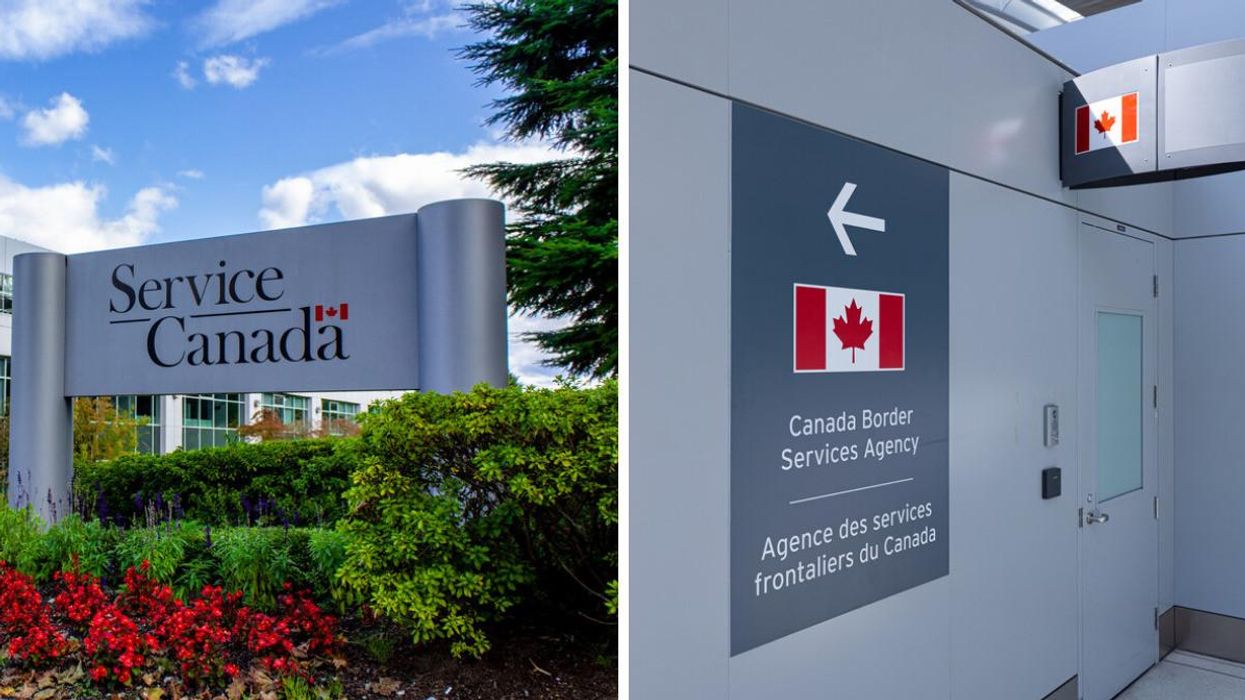4 Common Scams In Canada To Watch Out For & How To Know If Something Fishy Is Going On
Be careful, Canada! 👀

A Service Canada branch. Right: A Canada Border Services Agency.
Anyone who has ever had a phone in Canada probably knows what it's like to receive a scam call.
Maybe it's someone calling to tell you that you're wanted for some major crime, that your SIN number has been compromised, or something even more bizarre.
So the Government of Canada has put together a list of the most common scams in the country, what they look or sound like, and the best way to deal with them.
And with new scams getting invented daily, it's always good to know the hallmarks of some fishy activity.
Pretending to be Service Canada
A common hoax that people use to try to get personal information is pretending to be Service Canada officials.
When doing this, they'll often do stuff that a real Service Canada official would never do, such as making unsolicited calls or requesting personal information like your name, phone number, bank account number and more.
Service Canada will only ever will contact you through ways you've signed up for and will only make unexpected calls when "delivering Government of Canada services," but those instances are very rare.
When in doubt, call up 1-800-O-Canada (1-800-622-6232) and inquire with them about whatever the person who originally contacted you spoke about. That's the best way to verify if it's genuine.
Impersonating a CRA official
Another common scam is someone trying to impersonate an official from the Canada Revenue Agency (CRA).
Some tell-tale signs that the call or email is a scam is demanding payment with a cryptocurrency (like bitcoin), Interac e-transfer, pre-paid credit cards or gift cards.
It is also suspicious if they're being aggressive or threatening you with arrest or police action.
Be aware that the real CRA might ask for personal details like your birthday, SIN and more to verify your identity, but will never pressure you to act immediately or ask for a fee.
And, of course, you can always double-check with the CRA to ensure you're being contacted by the right people.
Targetting Newcomers to Canada
The third largest type of scam is one that specifically targets newcomers to the country.
Folks who have newly arrived in Canada should be suspicious of any emails asking for money or personal information, phone calls saying you've won a contest you didn't enter or a phone call or email saying you have a computer virus.
Additionally, Immigration, Refugee, and Citizenship Canada (IRCC) will never call you up asking you to pay fines, threaten to deport or arrest you, ask for information that you haven't previously given them or threaten you with violence.
If you think you've gotten a scam call, text or email, ask for the caller's name then hang up the phone. You then should contact the IRCC call centre and check if the call was real.
Posing as the CBSA
And finally, you could be contacted by someone claiming to be from the Canada Border Services Agency (CBSA).
A few things to know if you think you've been called by the CBSA is that they'll never ask for your SIN or credit card number, other personal information or demand money — by phone, email or text.
Additionally, the CBSA won't ever contact you asking you to pay duties or taxes on a package. But they might call you to clarify the shipping details.
Typically your mail carrier or courier will get in contact with you if you do need to pay anything.
It's also good to know that apps like ArriveCAN are free to use and that getting an Electronic Travel Authorization, which some foreign nationals need, only costs $7.
It should also be mentioned that this is not an exhaustive list. New scams are popping up all the time, so it's important to be vigilant and trust your gut.
If something seems off, it might just be because it is!
And, if you do become the victim of a scam or fraud, you can report it to Canada's Anti-Fraud Centre.
So keep your eye out there, Canada, and when in doubt, hang up, because no one wants to get cheated.
This article's cover image was used for illustrative purposes only.
- CERB Repayment Scams Are Real & The CRA Is Warning People ... ›
- Dating Scams Are On The Rise In Canada & A Whopping $64 ... ›
- 6 Biggest Scams That Ontarians Were Tricked By Last Year ... ›
- Thousands Of Canadians May Be Victims Of CERB Fraud & A Class Action Lawsuit Has Been Filed - Narcity ›
- Nearly Half Of Canadians Are Worried About Being Scammed & These Tips Could Help Protect You - Narcity ›
- Ex-Cop Exposes Gift Card Tampering At Shoppers Drug Mart & Apparently It Happens Often - Narcity ›
- These Are The Top Scams In Canada Around The Holidays & Here's What You Should Look Out For - Narcity ›
- One Of The Latest Scams In Canada Sees Fraudsters Posing As WestJet & Here's What To Look For - Narcity ›